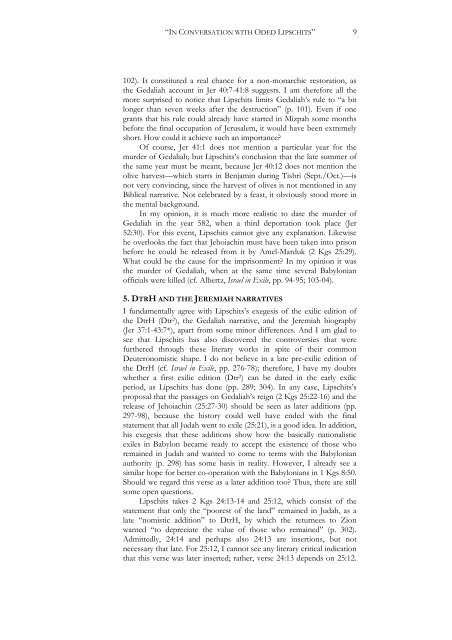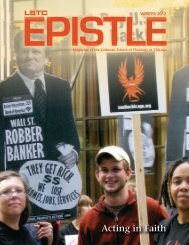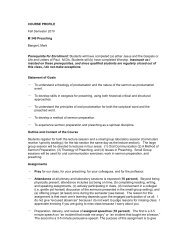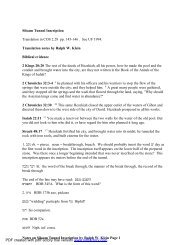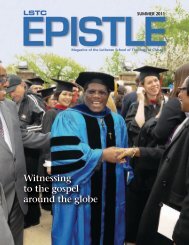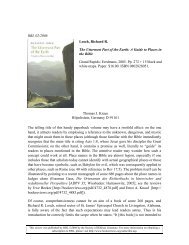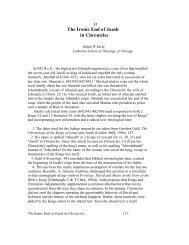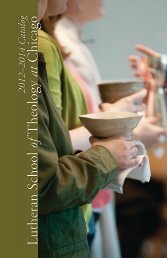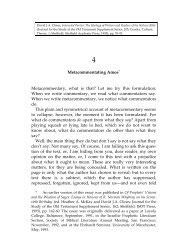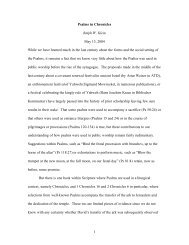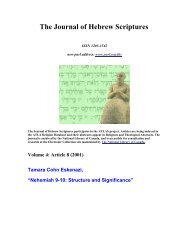Download this PDF file - University of Alberta - Journal Hosting
Download this PDF file - University of Alberta - Journal Hosting
Download this PDF file - University of Alberta - Journal Hosting
Create successful ePaper yourself
Turn your PDF publications into a flip-book with our unique Google optimized e-Paper software.
“IN CONVERSATION WITH ODED LIPSCHITS” 9102). It constituted a real chance for a non-monarchic restoration, asthe Gedaliah account in Jer 40:7-41:8 suggests. I am therefore all themore surprised to notice that Lipschits limits Gedaliah’s rule to “a bitlonger than seven weeks after the destruction” (p. 101). Even if onegrants that his rule could already have started in Mizpah some monthsbefore the final occupation <strong>of</strong> Jerusalem, it would have been extremelyshort. How could it achieve such an importance?Of course, Jer 41:1 does not mention a particular year for themurder <strong>of</strong> Gedaliah; but Lipschits’s conclusion that the late summer <strong>of</strong>the same year must be meant, because Jer 40:12 does not mention theolive harvest—which starts in Benjamin during Tishri (Sept./Oct.)—isnot very convincing, since the harvest <strong>of</strong> olives is not mentioned in anyBiblical narrative. Not celebrated by a feast, it obviously stood more inthe mental background.In my opinion, it is much more realistic to date the murder <strong>of</strong>Gedaliah in the year 582, when a third deportation took place (Jer52:30). For <strong>this</strong> event, Lipschits cannot give any explanation. Likewisehe overlooks the fact that Jehoiachin must have been taken into prisonbefore he could be released from it by Amel-Marduk (2 Kgs 25:29).What could be the cause for the imprisonment? In my opinion it wasthe murder <strong>of</strong> Gedaliah, when at the same time several Babylonian<strong>of</strong>ficials were killed (cf. Albertz, Israel in Exile, pp. 94-95; 103-04).5. DTRH AND THE JEREMIAH NARRATIVESI fundamentally agree with Lipschits’s exegesis <strong>of</strong> the exilic edition <strong>of</strong>the DtrH (Dtr 2 ), the Gedaliah narrative, and the Jeremiah biography(Jer 37:1-43:7*), apart from some minor differences. And I am glad tosee that Lipschits has also discovered the controversies that werefurthered through these literary works in spite <strong>of</strong> their commonDeuteronomistic shape. I do not believe in a late pre-exilic edition <strong>of</strong>the DtrH (cf. Israel in Exile, pp. 276-78); therefore, I have my doubtswhether a first exilic edition (Dtr 2 ) can be dated in the early exilicperiod, as Lipschits has done (pp. 289; 304). In any case, Lipschits’sproposal that the passages on Gedaliah’s reign (2 Kgs 25:22-16) and therelease <strong>of</strong> Jehoiachin (25:27-30) should be seen as later additions (pp.297-98), because the history could well have ended with the finalstatement that all Judah went to exile (25:21), is a good idea. In addition,his exegesis that these additions show how the basically nationalisticexiles in Babylon became ready to accept the existence <strong>of</strong> those whoremained in Judah and wanted to come to terms with the Babylonianauthority (p. 298) has some basis in reality. However, I already see asimilar hope for better co-operation with the Babylonians in 1 Kgs 8:50.Should we regard <strong>this</strong> verse as a later addition too? Thus, there are stillsome open questions.Lipschits takes 2 Kgs 24:13-14 and 25:12, which consist <strong>of</strong> thestatement that only the “poorest <strong>of</strong> the land” remained in Judah, as alate “nomistic addition” to DtrH, by which the returnees to Zionwanted “to depreciate the value <strong>of</strong> those who remained” (p. 302).Admittedly, 24:14 and perhaps also 24:13 are insertions, but notnecessary that late. For 25:12, I cannot see any literary critical indicationthat <strong>this</strong> verse was later inserted; rather, verse 24:13 depends on 25:12.


